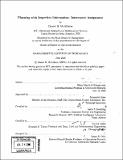| dc.contributor.advisor | Leslie P. Kaelbling. | en_US |
| dc.contributor.author | McAllister, Daniel B. (Daniel Brandford) | en_US |
| dc.contributor.other | Massachusetts Institute of Technology. Operations Research Center. | en_US |
| dc.date.accessioned | 2007-02-21T13:10:30Z | |
| dc.date.available | 2007-02-21T13:10:30Z | |
| dc.date.copyright | 2006 | en_US |
| dc.date.issued | 2006 | en_US |
| dc.identifier.uri | http://hdl.handle.net/1721.1/36229 | |
| dc.description | Thesis (S.M.)--Massachusetts Institute of Technology, Sloan School of Management, Operations Research Center, 2006. | en_US |
| dc.description | Includes bibliographical references (p. 121-123). | en_US |
| dc.description.abstract | We consider the problem of assigning a scarce number of interceptors to a wave of incoming atmospheric re-entry vehicles (RV). In this single wave, there is time to assign interceptors to a wave of incoming RVs, gain information on the intercept status, and then if necessary, assign interceptors once more. However, the status information of these RVs may not be reliable. This problem becomes challenging when considering the small inventory of interceptors, imperfect information from sensors, and the possibility of future waves of RVs. This work formulates the problem as a partially observable Markov decision process (POMDP) in order to account for the uncertainty in information. We use a POMDP solution algorithm to find an optimal policy for assigning interceptors to RVs in a single wave. From there, three cases are compared in a simulation of a single wave. These cases are perfect information from sensors; imperfect information from sensors, but acting as it were perfect; and accounting for imperfect information from sensors using the POMDP formulation. Using a variety of parameter variation tests, we examine the performance of the POMDP formulation by comparing the probability of an incoming RV avoiding intercept and the interceptor inventory remaining. We vary the reliability of the sensors, as well as the number of interceptors in inventory, and the number of incoming RVs in the wave. The POMDP formulation consistently provides a policy that conserves more interceptors and approaches the probability of intercept of the other cases. However, situations do exist where the POMDP formulation produces a policy that performs less effectively than a strategy assuming perfect information. | en_US |
| dc.description.statementofresponsibility | by Daniel B. McAllister. | en_US |
| dc.format.extent | 123 p. | en_US |
| dc.language.iso | eng | en_US |
| dc.publisher | Massachusetts Institute of Technology | en_US |
| dc.rights | M.I.T. theses are protected by copyright. They may be viewed from this source for any purpose, but reproduction or distribution in any format is prohibited without written permission. See provided URL for inquiries about permission. | en_US |
| dc.rights.uri | http://dspace.mit.edu/handle/1721.1/7582 | |
| dc.subject | Operations Research Center. | en_US |
| dc.title | Planning with imperfect information : interceptor assignment | en_US |
| dc.type | Thesis | en_US |
| dc.description.degree | S.M. | en_US |
| dc.contributor.department | Massachusetts Institute of Technology. Operations Research Center | en_US |
| dc.contributor.department | Sloan School of Management | |
| dc.identifier.oclc | 76955676 | en_US |
